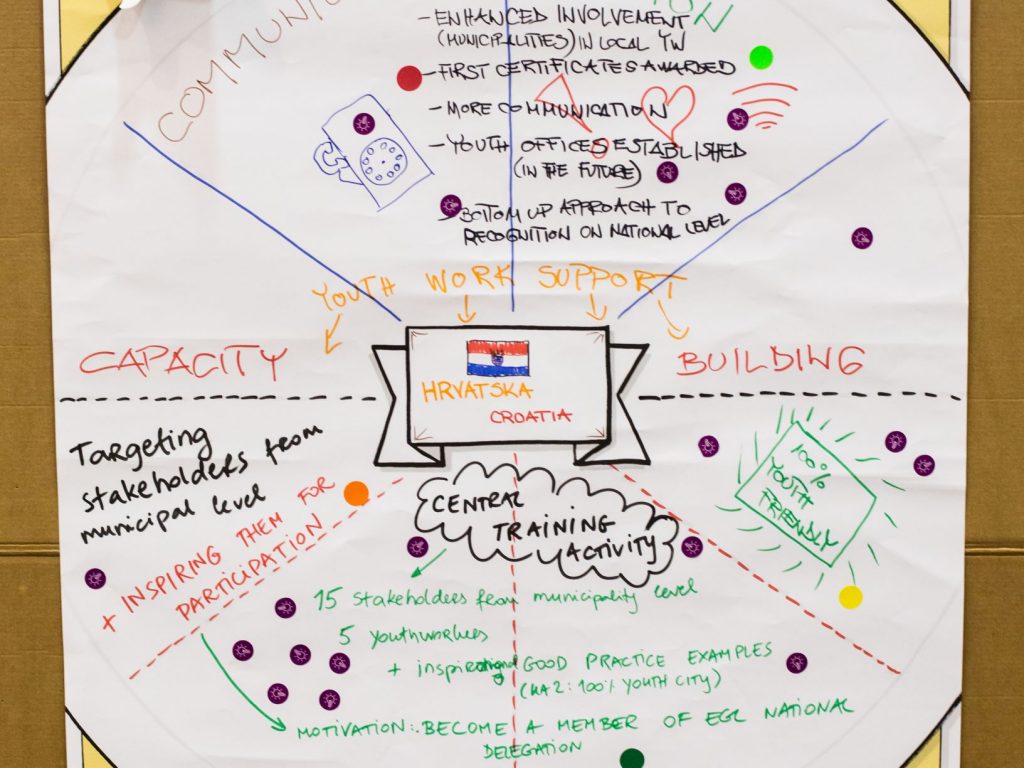I’m changing Europe!


Today, we introduce to you two members of the EGL team in Croatia - Aleksandra Švast and Marko Kovačić. Ms Švast is the National EGL Coordinator within the Croatian National Agency (NA) as well as a Senior Advisor in the Department for Strategic Partnerships and Structured Dialogue in the Youth Field. Marko Kovačić, who is a representative of the Institute for Social Research in Zagreb, helps with the implementation of EGL and acts as "co-coordinator" of EGL in Croatia. Mr Kovačić is also very active in the project on the European level. He was a part of the working group for the 3rd EGL event and will actively participate in the development of the EGL modular training.
In her interview, Ms Švast talks about the significance and impact of EGL on the ground, the importance of the partnership between EGL and the Croatian NA as well as sharing some good practices and strategy for continuing to develop quality local youth work in 2020 and beyond.
Q: Within the framework of EGL partnership, what are the highlights of the Croatian National Agency’s plan and strategy for 2020?
AS: Croatian EGL activities are based on providing individual support to 17 municipalities for their local youth work development. The central national activity is a Training Course (TC) on “Local youth work”. The TC gives a certain introduction to youth work and explains the role of municipalities in providing conditions for systematic and sustainable youth work.
It is quite dynamic, content wise and includes active participation of municipalities and creation of individual plans that would raise the quality of local youth work in their respective communities. The individual plans are prepared with the support of the members of the National Working Group (NWG).
Each NWG member is assigned to monitor and mentor a certain number of municipalities in the next 9 months after the TC. During this phase, mentors are required to keep in touch with their municipalities on a regular basis and actively support them in the implementation of their plans.
In the meanwhile, another national TC for municipalities will be organised in order to provide support in creating and maintaining efficient youth participation structures for involving youth in decision-making processes. As such, the TC will be based on specific goals of the Democracy reloaded project.
All the activities that will be carried out and results that will be achieved on both national and European level shall be presented during the national EGL conference. The conference will gather key stakeholders and new potential beneficiaries of the EGL project and contribute to the visibility of the Europe Goes Local project.
Q: In what way will the plan and strategy help advance youth work in 2020 in Croatia?
AS: The above-described concept of national activities was first implemented during 2018 and 2019 in the first edition of the national EGL in Croatia. Back then, we worked with 11 municipalities. The project provided municipalities with key information on quality youth work, prerequisites for its successful and sustainable implementation, funding resources etc. The municipalities realized the importance of involving young people in decision-making. Some of them established Youth Councils or applied and received funds for KA3 projects which helped them to bring local youth programmes. A certain number of “newcomers” in youth work did the mapping of the key stakeholders in their local community and established strategic cooperation with them on youth-related topics. Two municipalities employed or appointed a person that will be in charge of tasks related to youth. They became aware of different funding resources apart from municipal budget and some of them even received financial support for their projects in various tenders.
The scope of results varies from municipality to municipality (according to the different level of youth work developments among them) but we can for sure say that majority of participating municipalities received key knowledge for further youth work development beyond the EGL project.
We expect at least the same results of the new group of municipalities within plan and strategy for 2020.
Q: How do exchange/study visits help advance the quality of local youth work implementation? What do you hope to learn from and share with your counterpart?
AS: Along with the national activities, transnational cooperation is also in the focus of our national EGL strategy. Transnational networking is inevitable and crucial for all organisations looking to enhance their capacities and to keep up with the current trends. Municipalities are no exception. This is the reason we strongly emphasize the significance of transnational cooperation among municipalities we are working with and encourage them to use Transnational Cooperation Activities (TCA)[1] as much as possible. Within the EGL project, study visits to Lithuania and Slovenia will be carried out. We also plan to host a study visit for Slovenian and Lithuanian municipalities. These are tailor-made study visits, which should respond to the specific needs of our municipalities, enabling them to exchange good practices and tips and share challenges they are facing as well as encourage them to make a partnership in future projects.
Q: How do you plan to use the European Charter to create good practices and standards for quality local youth work in your country?
AS: The EGL Charter is promoted in Croatia as an important tool which should guide the work of all stakeholders active in the youth field. We are looking forward to the EGL Toolkit that will make the implementation of the Charter’s principles easier. In order to make the EGL Charter visible beyond the group of national project participants, we established a cooperation with Association of Cities that will help us to spread a word about the EGL Charter and to motivate other cities to act according to its principles. The long-term goal of the Association of Cities is the certification of cities in Croatia as “youth-friendly”. The organisation of the local youth work according to EGL Charter principles will also be considered as one of the criteria for the label of “youth-friendly cities”.
[1] TCA is an Erasmus+ instrument, which promotes transnational cooperation and exchange of practices between various stakeholders (organisations, youth workers, municipalities, teachers etc.). TCAs can be organized in various formats such as training courses, study visits, seminars, conferences etc. TCAs are organized by national agencies and Salto resource centres.
